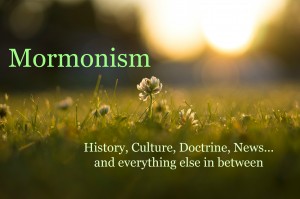After learning the basics of Mormonism and becoming a convert at age seventeen, I settled into trying to learn the Mormon worldview. Even as a teenager, I was a thinker. I liked to understand things and my parents, who did not become Mormon, had raised me to try to see things the way others do. They made it clear I didn’t have to agree with every worldview I studied—but I did have to understand it if possible. So, I went to work learning to understand how Mormons see the world.
 Over time, I came to understand that while Mormons very much live in this world and work to make it a good life, they see this world as what is probably the very shortest phase of our eternal lives. Mormons believe in a three-stage life. We lived with God as spirits before we were born, spending time learning the gospel, developing a personal relationship with God, and preparing for mortality. Then we came here. After this life, we begin our eternal lives, a life that will be determined by the choices we make here on Earth.
Over time, I came to understand that while Mormons very much live in this world and work to make it a good life, they see this world as what is probably the very shortest phase of our eternal lives. Mormons believe in a three-stage life. We lived with God as spirits before we were born, spending time learning the gospel, developing a personal relationship with God, and preparing for mortality. Then we came here. After this life, we begin our eternal lives, a life that will be determined by the choices we make here on Earth.
This worldview, known as the Plan of Salvation or the Great Plan of Happiness, gives Mormons a different view of the world than many have. It causes them to focus on long-term goals, so long we will not experience the complete fulfillment of them until after our deaths. It doesn’t mean Mormons don’t work to make this life great—education, learning new skills, and building relationships are all part of our lives here. But everything is filtered through eternal lenses.
Family
 Mormons are well known for their focus on quality family life. Although a great family makes this life easier and more wonderful, Mormons also believe family isn’t a temporary gift from God. God made no secret of His knowledge that families matter. The Bible begins with the creation of a family and includes instructions on how it is to work. Mormons don’t believe He would fill our hearts with such a powerful love for our families and then yank them away from us at the very moment Heaven begins. Who wants to live forever if it means being without your family?
Mormons are well known for their focus on quality family life. Although a great family makes this life easier and more wonderful, Mormons also believe family isn’t a temporary gift from God. God made no secret of His knowledge that families matter. The Bible begins with the creation of a family and includes instructions on how it is to work. Mormons don’t believe He would fill our hearts with such a powerful love for our families and then yank them away from us at the very moment Heaven begins. Who wants to live forever if it means being without your family?
Eternal families are a core Mormon belief. Because Mormons believe it is possible for family life to continue long after death, they tend to work harder at their marriages, their parenting, and their relationships with other family members. They want to make those relationships worthy of eternity and they try not to let things that are important only in mortality destroy that gift from God. It keeps them focused on eternity, and that makes mortal challenges less important.
Trials
 If this life was all we had, trials would seem pretty unfair. It would be unfair that some are born rich and some poor. It would be unfair that some are born into happy families while others are born into families that struggle. It would be unfair that some people seem to have easy lives while others have an extraordinary number of trials.
If this life was all we had, trials would seem pretty unfair. It would be unfair that some are born rich and some poor. It would be unfair that some are born into happy families while others are born into families that struggle. It would be unfair that some people seem to have easy lives while others have an extraordinary number of trials.
Viewed from an eternal perspective, though, trials are fair. We came to Earth already a person who had lived a long time. We had developed strengths and weaknesses, talents and challenges. We came here, in part, to become more than we already were. Our trials were permitted in order to give us the exact opportunities we needed to become everything God knows we can be.
We’ve all read stories of people from terrible situations who continued to live in those circumstances, blaming their problems on their failure to succeed in life. We’ve read of others, living in those same situations, who chose to rise above them, to use the trials to make them stronger and wiser. Many of those people then choose to return to help others through the same trials.
Our trials often motivate us to learn new skills, to improve our character, to push harder than we might have otherwise. We may not be able to control our trials, but we can control what we do with them. Eternity gives them meaning. We have trials for a short time here on Earth, and we can enjoy the blessings that result from them forever. Somehow, the trials seem less upsetting when we understand how short this life is and how long the rewards for a successful trial will be.
Mortal Limitations
Mortality can be confusing. The world sends us so many messages about how life ought to be and sometimes God sends us different messages about how life ought to be. Often, the messages of the world are so loud it can be hard to hear God’s message and we find ourselves trying to see God’s world through mortality’s lenses. We try to take the current and always changing mortal worldview and squash it into God’s never-changing eternal worldview.
The things that seem so important in this world—money, fame, equality, popularity, temporary pleasure, complete freedom—those things seem important only when viewed through a mortal lens. They seem to make life better, partly because people keep telling us they will make life better.
However, when we still the noise of the world and listen to God’s message, a better lens shows us the world as it really is. We begin to think about living forever. We ask ourselves, “In the eternal scheme of things, will this really matter?” We wonder, “In a million years, are we still going to care that we didn’t have some of mortality’s priorities?”
Our priorities begin to change. We start to think about what will really impact our eternal salvation. When eternity becomes real enough to us, we stop worrying so much about those mortal limitations and just focus on the things of eternity. That is when we begin to truly live a life of joy.
Joy, true joy, comes from the things of eternity, not the things of today.
About Terrie Lynn Bittner
The late Terrie Lynn Bittner—beloved wife, mother, grandmother, and friend—was the author of two homeschooling books and numerous articles, including several that appeared in Latter-day Saint magazines. She became a member of the Church at the age of 17 and began sharing her faith online in 1992.







